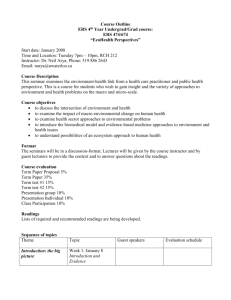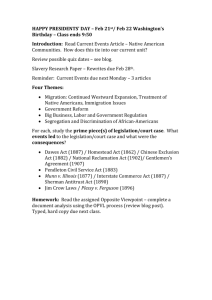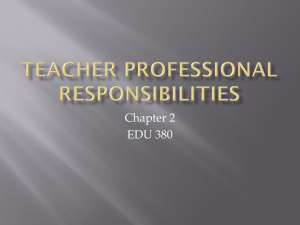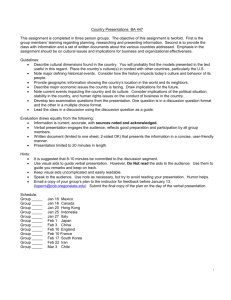CRITICAL PERSPECTIVES ON LEARNING AND TEACHING FDN
advertisement
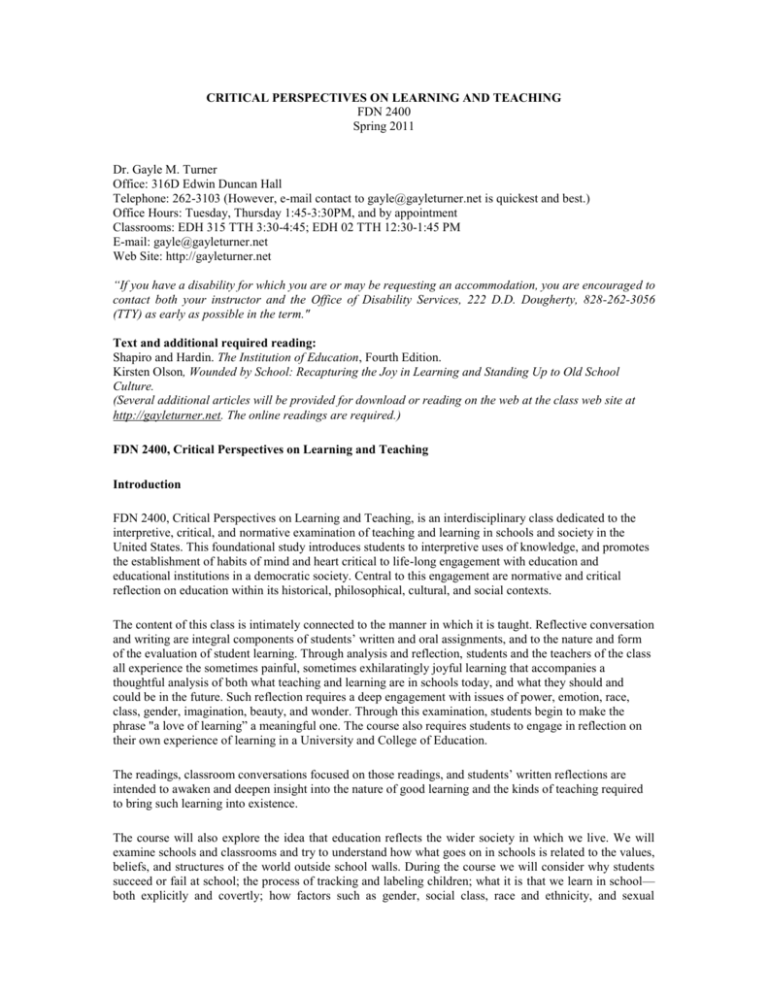
CRITICAL PERSPECTIVES ON LEARNING AND TEACHING FDN 2400 Spring 2011 Dr. Gayle M. Turner Office: 316D Edwin Duncan Hall Telephone: 262-3103 (However, e-mail contact to gayle@gayleturner.net is quickest and best.) Office Hours: Tuesday, Thursday 1:45-3:30PM, and by appointment Classrooms: EDH 315 TTH 3:30-4:45; EDH 02 TTH 12:30-1:45 PM E-mail: gayle@gayleturner.net Web Site: http://gayleturner.net “If you have a disability for which you are or may be requesting an accommodation, you are encouraged to contact both your instructor and the Office of Disability Services, 222 D.D. Dougherty, 828-262-3056 (TTY) as early as possible in the term." Text and additional required reading: Shapiro and Hardin. The Institution of Education, Fourth Edition. Kirsten Olson, Wounded by School: Recapturing the Joy in Learning and Standing Up to Old School Culture. (Several additional articles will be provided for download or reading on the web at the class web site at http://gayleturner.net. The online readings are required.) FDN 2400, Critical Perspectives on Learning and Teaching Introduction FDN 2400, Critical Perspectives on Learning and Teaching, is an interdisciplinary class dedicated to the interpretive, critical, and normative examination of teaching and learning in schools and society in the United States. This foundational study introduces students to interpretive uses of knowledge, and promotes the establishment of habits of mind and heart critical to life-long engagement with education and educational institutions in a democratic society. Central to this engagement are normative and critical reflection on education within its historical, philosophical, cultural, and social contexts. The content of this class is intimately connected to the manner in which it is taught. Reflective conversation and writing are integral components of students’ written and oral assignments, and to the nature and form of the evaluation of student learning. Through analysis and reflection, students and the teachers of the class all experience the sometimes painful, sometimes exhilaratingly joyful learning that accompanies a thoughtful analysis of both what teaching and learning are in schools today, and what they should and could be in the future. Such reflection requires a deep engagement with issues of power, emotion, race, class, gender, imagination, beauty, and wonder. Through this examination, students begin to make the phrase "a love of learning” a meaningful one. The course also requires students to engage in reflection on their own experience of learning in a University and College of Education. The readings, classroom conversations focused on those readings, and students’ written reflections are intended to awaken and deepen insight into the nature of good learning and the kinds of teaching required to bring such learning into existence. The course will also explore the idea that education reflects the wider society in which we live. We will examine schools and classrooms and try to understand how what goes on in schools is related to the values, beliefs, and structures of the world outside school walls. During the course we will consider why students succeed or fail at school; the process of tracking and labeling children; what it is that we learn in school— both explicitly and covertly; how factors such as gender, social class, race and ethnicity, and sexual orientation affect our educational experiences. We will also explore what function is played by schooling in American society, and how other forms of ‘education’ such as television and advertising influence us. In looking at these issues, FDN 2400 will draw upon the findings and methods of philosophy, sociology, anthropology, history, economics, psychology and political science. The form and content of the class is intended to provide a basis for critical analysis of schools within the framework of a commitment to humanistic values. Since all of us are intimately familiar with the process of education and schooling, it is intended that the classes will move frequently between the theoretical and the personal. For this reason, students’ input in the form of questions, comments, and discussion is a vital part of the course. It is hoped that the experience will offer individuals an opportunity to stand back and take a broader look at a part of our world in which we invest so much time and energy. The course will include lectures, class, and small group discussion. There will be ample room for discussion of readings and lecture materials. In addition, several videos will be shown Central Questions Curriculum How do we as human beings decide how we should live, and what it is worthwhile to know? Where does curriculum come from? What is the difference between the hidden and the overt curriculum? What is it most important for us to know? What is most worthy of our deepest and fullest attention, as having most bearing not only on what we are and do, but also on what we might become? Why do we teach only certain things, and not others? What should education be in the service of? What is the difference between education and schooling? How is education as a process different from education as an outcome? Power and Justice What characterizes a just society, and what role, if any, must schools play in the pursuit of justice? What is the purpose of schooling in a democratic society? Why do we have public schools? How should we view the children, adolescents, teachers, and other school personnel whose lives come together in this place we call “school”? How might we make sense of conflict in society, and in educational institutions? How does social class impact educational outcomes? How do race and ethnicity impact educational outcomes? What connections are there between race and social class? What is “sexual identity”? How does schooling affect identity in general, and sexual identity in particular? What is the teacher’s responsibility for ethical behavior and the creation of meaning? What does it mean to behave ethically? How does the organization and administration of schools, and government policy, influence power and justice in schools? Knowledge, Emotion, and Identity How is the individual defined? How should one live? What characterizes a caring relationship? How do we know how to treat each other? What does it mean to claim that teachers should care for students? Is caring the same in the classroom as it is elsewhere in one’s life? How does one release the imagination? How should we think about the kind of education and the kinds of relationships that occur in schools and in society? How should we understand the emotional lives of children, adolescents, and adults both in schools and in their lives outside of schools? How should we understand the relationship between reason and emotion, the “head and the heart”? What are the relationships among “love,” “desire,” “imagination,” and teaching and learning? What were the high and low points of your own schooling? "Appalachian State University is committed to making reasonable accommodations for individuals with documented qualifying disabilities in accordance with the Americans with Disabilities Act of 1990, and Section 504 of the Rehabilitation Act of 1973. Those seeking accommodations based on a substantially limiting disability must contact and register with The Office of Disability Services (ODS) at www.ods.appstate.edu or 828-262-3056. Once registration is complete, individuals will meet with ODS staff to discuss eligibility and appropriate accommodations." Course Requirements 1. Reading: Read each assignment before the date it is scheduled for class discussion. 2. Class participation and attendance: The success of the class depends on each student attending all classes, all the time, and on time. 3. Quizzes: There will be quizzes on all your readings. These are available online at ASU Learn. You will need to log in and select FDN 2400 and your section number. Quiz availability will also be posted on ASULearn. The quizzes are carefully designed to measure your comprehension of the readings, discussions, and crucial course content. Grading 1. Class participation: 25 percent. This will include work regarding the text Wounded by School. (If you are not in class it makes it very difficult to receive the full 25 percent.) 2. Quizzes: 75 percent. Each quiz is 25% of your grade. COURSE SYLLABUS A. The Educational Process: Theory and History Holidays Class Meeting Dates Jan. 11 Jan. 13 Hindi Jan. 14 United States Jan. 17 Jan. 18 Jan. 20 Jan. 25 Class Topics, Assigned Readings, and Related Links Key questions: Why do we have public schools? What kind of power do teachers have in public schools? Where does curriculum come from? What is the difference between the hidden and the overt curriculum? Introduction. Download PDF syllabus. Click here. Remember, the online version is the official syllabus. You are required to consult it for readings and other class assignments. Quiz study guide: Word doc. PDF. John Taylor Gatto, “Bitter Lessons: What’s Wrong with American Teachers,” p. 3. PDF Philip Jackson, “The Daily Grind,” p. 9. PDF No Class. Makar Sankranti/Lobri. Marks the end of winter and the advent of spring. No Class. State Holiday. Martin Luther King, Jr. Day. A national holiday celebrating the life and achievements of the famed civil rights movement leader. He shaped the non-violent movement against unjust U.S. laws. The holiday was resisted by many states and was not celebrated by all 50 until the year 2000. Negative and positive freedom (lecture); Bloom's Taxonomy. Sarah J. McCarthy, “Why Johnny Can’t Disobey,” p. 35. PDF Negative and positive freedom; Bloom's Taxonomy, revisted. Video: The Milgram Experiment. Video: Remember Mai Lai. Jan. 27 Feb. 1 China Feb.3 Feb. 3 Hindi Feb. 8 Feb. 8 Feb. 10 Christian Secular Feb. 14 Feb. 15 Muslim Feb. 16 Feb. 17 Feb. 22 Feb. 24 Muslim Feb. 26 March 1 March 3 "Without Sanctuary: Photographs and Postcards of Lynching in America." Click here. (The "official" site has been removed, but the photos and text from the exhibit are still available. Please browse, and be sure to click on the link that will tell you more about any postcard you view. Glance now, peruse thoroughly later. See below.) Video: Remember Mai Lai, continued. John Dewey, “My Pedagogic Creed.” David Purpel, “Moral Outrage and Education,” p. 251. Herbert M. Kliebard, “Three Currents of American Curriculum Thought,” p. 75 . Svi Shapiro, “Public School Reform: The Mismeasure of Education,” p. 27. Plato, “The Allegory of the Cave,” Click here. Philosophies of education and learning theories: Click here. B. Education, Social Class, and Equality Key questions: How does social class impact educational outcomes? Can negative impacts be avoided? How? Chinese New Year. 4709 - Year of the Rabbit TBA Vashant Panchami. Festival honoring the Goddess of Learning, Wisdom and Fine Arts. Video: People Like Us: Social Class in America. Click here. Video: People Like Us: Social Class in America, continued. No Class. St. Valentine's Day. Originally in honor of more than one early Christian martyr. Deleted in the 1969 revision of the Roman Catholic Calendar of Saints. A day of celebration honoring the spirit of love. Exchanging love messages, poems, flowers, and candy are common. Dorothy Allison, “A Question of Class.” Video: People Like Us: Social Class in America, continued. No Class. Mawlid an Nabi. The Prophet Muhammad's Birthday. Jean Anyon, “Social Class and the Hidden Curriculum of Work.” JoMills Braddock II, et al, “Ollie Taylor’s Story: How Tracking and Ability Grouping Affects Our Children,” p. 121. "Growing Good Principals" (from The Charlotte Observer), . Click here. Adam Gamoran, "Is Ability Grouping Equitable?" Click here. Clotfelter, et al., "Segregation and Resegregation in North Carolina’s Public School Classrooms." Resegregation through tracking. Click here. North Carolina Middle School Association Research Bulletin on tracking and ability grouping. Click here. North Carolina Dept. of Public Instruction, "Grouping Practices Research Brief." Click here. Video: Inner City Debate Team. Bill Bigelow, “The Human Lives Behind the Labels: The Global Sweatshop, Nike, and the Race to the Bottom.” From Rethinking Schools: An Urban Education Resource. Click here. An interview with history teacher Bill Bigelow. Click here. No Class. Mawlid an Nabi. Prophet Muhammad's Birthday Stephan Jay Gould on IQ. Click here. Nicholas Lemann, "Behind the SAT." Video: Inner City Debate Team Lisa Delpit, “The Silenced Dialogue: Power and Pedagogy in Educating Other People's Children," Click Here. Hindi March 3 Christian March 8 March 8 Christian March 9 March 10 Christian March 13 March 15 Hindi March 16 March 17 Hindi March 19 Jewish March 20 Christian March 20 March 22 March 24 Lisa Delpit, Ebonics and Culturally Responsive Instruction. Click Here Maha Shivaratri. Day of fasting followed by a night ceremony in honor of Lord Shiva. Lord Shiva is one aspect of the Divine. (Brahma and Vishnu complete the Trimurti.) Spring Break. No class. Shrove Tuesday. Practice of confession the day before the start of Lent. No Class. Ash Wednesday. First day of Lent signified by the placing of an ash cross on the forehead. It is a day of fast and abstinence from meat. Spring Break. No class. No Class. Lent, First Sunday of. Lent is the period of prayer, fasting, and penitence leading up to Easter, the commemoration of the death and resurrection of Jesus Christ. D. Education and Race Key questions: How does race impact educational outcomes? Can negative impacts be avoided? What connections are there between race and social class? Video: Eyes on the Prize. [VC6675] Martin Luther King, “Letter From Birmingham Jail.” Click Here. Additional information from Human Rights Watch. Without Sanctuary: Lynching in America. Click here. (The "official" site has been removed, but the photos and text from the exhibit are still available. Please browse, and be sure to click on the link that will tell you more about any postcard you view.) No class. Different regions of India celebrate New Years at different times. So while some celebrate the New Year today, other Hindus celebrate the New Year in the Fall during Diwali. Peggy McIntosh, “White Privilege: Unpacking the Invisible Knapsack,”click here. Robert Lake, “An Indian Father’s Plea,”Click Here. Indian Boarding Schools: "I felt as if I were dead and traveling to the Spirit Land". A teacher resource from the Library of Congress. Click here. Indian Boarding Schools: "The Challenges and Limitations of Assimilation." Click here. "Appropriate Methods For Teaching About Native American Peoples." Click here. Teaching Thanksgiving Links: (From the forum discussion). No Class. Holi. Festival of Colors. Celebrates the destruction of evil. Signifies the renewal of life. No Class. Purim. Celebrates the story of Esther and how she saved the Jewish people in her kingdom from a massacre planned by Haman. No Class. Lent, Second Sunday of. Lent is the period of prayer, fasting, and penitence leading up to Easter, the commemoration of the death and resurrection of Jesus Christ. Cornel West, “Race and Social Justice in America,” p. 409. A short excerpt from a new book, Slavery By Another Name: Link to NPR Additional photos from the book: Photos Martha A. Bireda, "The Mythical African American Male," p. 187. Video: A Class Divided. E. Education and Sexual Identity Key questions: What is "sexual identity"? How does schooling affect identity in general, and sexual identity in particular? Can one's sexual identification affect school performance? Why and how? Student Panel. Discussion of gay, lesbian, bi-sexual and transgender issues. Christian Christian Hindi Christian Jewish Christian Arrive at class with at least one question you would like to discuss with the panel. An interview with the author of a new book on whiteness: Click Here No Class. Lent, Third Sunday of. Lent is the period of prayer, fasting, and March 27 penitence leading up to Easter, the commemoration of the death and resurrection of Jesus Christ March 29 Angela Phillips, "In the Beginning There are Babies," p. 203. Michael Kimmel, "What About the Boys?" p. 221. March 31 Video: The Transgender Revolution. No Class. Lent, Fourth Sunday of. Lent is the period of prayer, fasting, and April 3 penitence leading up to Easter, the commemoration of the death and resurrection of Jesus Christ. TBA April 5 Bring at least one advertisement to class. It will be used to help us discuss the April 7 social construction of gender. Video: Slim Hopes [VC 7575]. Rama Navami. Rama' birthday. Rama is the hero of the Ramayana, one of the April 12 two April 12 Doug Risner "What Mathew Shepard Would Tell Us," p. 209. E. The Educational Process: Theory and History, Revisited Media resources for the beginning teacher: Help in avoiding the "path of least April 14 resistance." No class. Palm Sunday. Sunday before Easter. Remembers Christ's entry into April 17 Jerusalem where Palm branches were laid in his path. No Class. Passover ( Pesach). First Seder. Celebrates Jewish Exodus in 13th century BC from Egypt after generations of slavery. Bread is replaced by April 18 Matzoh. The final night of Passover 2011 is April 26. Families may gather for the ritual feast (Seder) on more than one night during Passover. April 19 Book banning, and other possibilities. Confederate and Kippah assignment. April 21 Jonathan Kozol, “Great Men and Women,” p. 325. "Put to the Test," No Child Left Behind: Pro and Con, Click Here Helen Keller; Rosa Parks, an editorial perspective NC State Holiday. Good Friday. Commemorates the Crucifixion of Jesus. Day April 22 of fast and abstinence from meat. April 26 TBA April 28 Reading Day. No class. Exam Period, Saturday, April 30, 2011 from Noon - 2:30 PM. Hope Day April 30 Potluck Lunch. (Section meeting at 3:30; i.e. Section 105) Exam Period, Wednesday, May 4, 2011 from 9:00 AM -11:30 AM. Hope May 4 Day Potluck Brunch. (Section meeting at 12:30 PM; i.e. Section 104)
